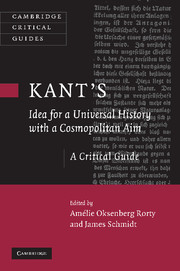Book contents
- Frontmatter
- Contents
- List of contributors
- List of abbreviations
- Introduction: history as philosophy
- Idea for a Universal History with a Cosmopolitan Aim
- 1 Teleology and history in Kant: the critical foundations of Kant's philosophy of history
- 2 The purposive development of human capacities
- 3 Reason as a species characteristic
- 4 Good out of evil: Kant and the idea of unsocial sociability
- 5 Kant's Fourth Proposition: the unsociable sociability of human nature
- 6 The crooked timber of mankind
- 7 A habitat for humanity
- 8 Kant's changing cosmopolitanism
- 9 The hidden plan of nature
- 10 Providence as progress: Kant's variations on a tale of origins
- 11 Norms, facts, and the philosophy of history
- 12 Philosophy helps history
- Bibliography
- Index of names and works
2 - The purposive development of human capacities
Published online by Cambridge University Press: 28 July 2009
- Frontmatter
- Contents
- List of contributors
- List of abbreviations
- Introduction: history as philosophy
- Idea for a Universal History with a Cosmopolitan Aim
- 1 Teleology and history in Kant: the critical foundations of Kant's philosophy of history
- 2 The purposive development of human capacities
- 3 Reason as a species characteristic
- 4 Good out of evil: Kant and the idea of unsocial sociability
- 5 Kant's Fourth Proposition: the unsociable sociability of human nature
- 6 The crooked timber of mankind
- 7 A habitat for humanity
- 8 Kant's changing cosmopolitanism
- 9 The hidden plan of nature
- 10 Providence as progress: Kant's variations on a tale of origins
- 11 Norms, facts, and the philosophy of history
- 12 Philosophy helps history
- Bibliography
- Index of names and works
Summary
Kant's pivotal essay of November 1784 is the key text that links his Critical philosophy directly to the issue of history, and it does so in a way that, from the very beginning, also clearly transcends a focus on the mere individual. Nonetheless, the fact that this essay, like many of Kant's other writings, devotes considerable attention to history and human society as a topic does not by itself show that Kant's own philosophy is historical in a “fundamental” way, even if it is admittedly not “ahistorical” in a typical “pejorative” sense. For this reason alone the essay deserves further examination, even if there is no non-controversial way to establish whether it shows that Kant's philosophy is fundamentally historical, or whether this would be a good thing.
AN INITIAL GLANCE: THESIS, CONTEXT, TITLE
Many of the main difficulties that arise here can be gathered from simply an initial glance at the essay's carefully worded title, its complex historical context, and its bold first thesis, that “All natural predispositions of a creature are determined sometime to develop themselves completely and purposively” (8:18).
The genetic problem
It is only natural to object that the formulation of the thesis goes much too far in many ways by speaking of what is “determined,” “complete,” “purposive,” and about “all” natural dispositions of “all” creatures.
- Type
- Chapter
- Information
- Publisher: Cambridge University PressPrint publication year: 2009
- 9
- Cited by



